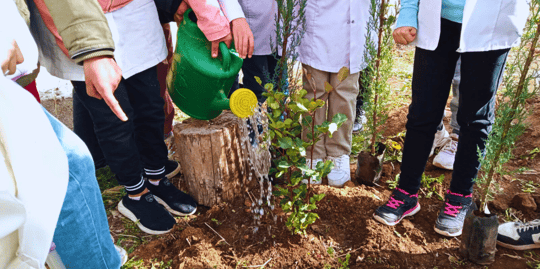Morocco’s Grassroots Movement to Preserve Crops and Culture

In Morocco, the High Atlas Foundation is working with farming communities to preserve traditional crops by building nurseries for native fruit and nut trees. Through these efforts, they aim to promote women’s empowerment and food sovereignty.
The High Atlas Foundation (HAF) is a community development organization committed to helping preserve traditional crops across Morocco through participatory planning, community nurseries, women’s cooperatives, and youth engagement. By helping farming families shift from starchy staple crops to high-value heritage varieties including carob, almond, argan, and olive, HAF tries to protect agrobiodiversity, improve livelihoods, and strengthen long-term food and nutrition security.
The Foundation integrates fruit tree planting with initiatives that support literacy, women’s empowerment, cultural preservation, and youth opportunity. This model is designed to help farming communities grow crops while strengthening the social and economic systems that sustain them—and it is yielding lasting outcomes.
“We have seen rural agricultural incomes grow multiple fold as a result of our 25 years of planting trees,” says HAF President Yossef Ben-Meir, pointing to rising prices for olive oil and carob, which have doubled in recent years.
The tree nursery development projects begin with community-led decision-making during empowerment workshops that “assist local people’s confidence-building, self-discovery, and analysis of the social relationships, emotions, and key aspects of their lives,” Ben-Meir tells Food Tank. This approach, he says, helps participants define the initiatives they need most and “enhances the likelihood of sustainability and affirms the decision making of the local people.”
At the heart of HAF’s work is the planting of organic and indigenous seed varieties deeply rooted in their regions—chosen and cultivated by communities themselves. “The seeds of local varieties are native to their region and so there is a sincere appreciation of this important biodiversity element to the program,” says Ben-Meir. Alongside fruit trees, HAF supports the cultivation of local medicinal and aromatic plants, drawing on generations of knowledge in harvesting, drying, and selling them. This expertise, he says, “is based on their heritage.”
Fruit tree agriculture in Morocco has traditionally “been in the male domain of production,” Ben-Meir explains, so women generally have less direct experience with it. But women have long been stewards of wild medicinal plants, which play a vital role in their livelihoods and culture. As more women take on leadership roles in nursery management and crop cultivation, Ben-Meir sees that dynamic evolving.
To help overcome what Ben-Meir describes as the “gender division of production,” HAF helps connect rural women who have studied at public universities with young women in their home communities who haven’t had the same educational opportunities. These returning graduates collaborate with local women to develop agricultural enterprises—like tree nurseries or value-added products—that empower their peers and expand women’s roles in fruit tree cultivation. “This is key for our future,” he says.
But water scarcity remains a major obstacle to the success of these women and their communities. Water access and management “is by far the costliest input that communities and HAF are committed to implementing,” Ben-Meir explains. He adds that water scarcity “inhibits farming families from planting and diversifying their crop away from the barley and corn.”
To help farming communities out of poverty, Ben-Meir says, significant investment is needed in water infrastructure. This includes wells, basins, solar panels, pumps, piping, and the training required to maintain them. But limited financial resources and rising seed costs make it difficult to meet these growing infrastructure needs.
As these irrigation challenges intensify, Ben-Meir says that long-term resilience depends on the preservation of the genetic resources that underpin sustainable agriculture to safeguard biodiversity and prepare communities for future crises. According to the U.N. Food and Agriculture Organization, “genetic resources are crucial to help agriculture cope with pests, plant diseases, and climate change.”
HAF works to formalize seed storage, but much of the current seed stock still comes from farming families. Their cuttings form the initial seed stock needed for reseeding local sustainable tree nurseries.
The Foundation looks to local partners including the Moroccan Jewish community, which lends unused land adjacent to their historic cemeteries at no cost for communities to build nurseries. Ben-Meir explains, “this kind of interfaith collaboration for fruit tree projects determined by local people enhances the interfaith partnership and the preservation of these cultural heritage locations.”
But preserving Moroccan crop varieties “is not dependent on one specific partner,” Ben-Meir tells Food Tank, “but really is an identity-based priority as an organization, and that is genuinely held by farming associations, cooperatives, and communities.”
Articles like the one you just read are made possible through the generosity of Food Tank members. Can we please count on you to be part of our growing movement? Become a member today by clicking here.